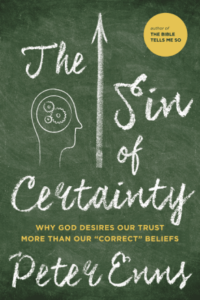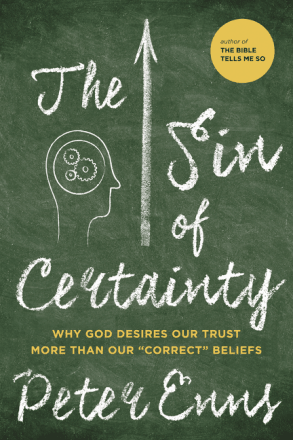 Well, it’s less than 2 months to go before the release of my next book The Sin of Certainty: Why God Desires Our Trust More than Our “Correct” Beliefs. Whenever I get to this stage, I feel like I need a break to recharge—but not before I took the time to sit down with myself for an interview. Frankly, I seemed somewhat distracted most of the time, but all in all I think I did a good job talking to myself and getting my point across.
Well, it’s less than 2 months to go before the release of my next book The Sin of Certainty: Why God Desires Our Trust More than Our “Correct” Beliefs. Whenever I get to this stage, I feel like I need a break to recharge—but not before I took the time to sit down with myself for an interview. Frankly, I seemed somewhat distracted most of the time, but all in all I think I did a good job talking to myself and getting my point across.
Me: First of all, explain what you mean by the title. What is the “Sin of Certainty”?
Me: Basically, it’s about the unfortunately common preoccupation with “knowing what you believe” in order to feel that you have “strong” faith. When faith is seen as the flip side to correct thinking about God, the Bible, etc., uncertainty about those things (which is inevitable) is then easily equated with “lack of faith,” which circles back to the preoccupation with getting that certainty back. The “sin” is that such preoccupation derails a deeper process of spiritual formation and growth.
Me: Sounds like a bunch of hokey meely-mouthed stupid liberal clap-trap wolf-in-sheeps-clothing heresy to me.
Me: Yeah, well, who cares what you think.
Me: And the next thing you’re going to tell me is that you waste all of our time by relaying some of your own “experiences” in the book.
Me: In fact, yes I do, but more here and there. It’s not a memoir or anything, but the book has grown out of my own experiences and how I’ve made sense of them.
Me: So the book’s basically about you, you’re favorite topic.
Me: Remember that time when you were little and mom got really mad because you were really mean and loud and nobody liked you? You’re doing it again.
Me: Whatever. OK, so if you don’t talk about yourself all of the time, what DO you talk about?
Me: A bunch of stuff. For example, I talk about where all this preoccupation with “getting it right” came from for Christians today, especially evangelicals . . .
Me: Why don’t you give it a rest already with the whole evangelical thing. It’s like you’re a voyeur or something. You think evangelicals are whacked. Fine. We get it. Move on.
Me: . . . and that preoccupation can be traced to the Protestant Reformation, where getting the Bible “right” became a major goal in ways it hadn’t before. That legacy has remained strong and is a prime reason why evangelicals have had such a hard time handling things that seem to “challenge” the Bible and shake their sense of certainty.
Me: You mean like evolution and historical criticism, those other topics you keep ranting about?
Me: I rant because they keep coming up generation after generation and that’s a big shame, that faith needs to be guarded by an intellectual fortress of solitude.
Me: Hey, that was nice. Is that line in the book?
Me: No. Just came to me now.
Me: Ok, well, anyway, that chapter sounds completely boring. Please tell me you didn’t lead with it.
Me: No. It’s chapter 2.
Me: Way to go, Hemingway.
Me: I really had to. I needed to lay out how we got into this mess before talking about a better way forward.
Me: Were you at least funny about it?
Me: Of course.
Me: Like how?
Me: For example, I call Charles Darwin “Chuck.”
Me: Wow, that’s really funny. Give me minute to compose myself. . . . What else ya got?
Me: Next I spend some time showing how the Bible has all sorts of examples of true people of faith who didn’t “know” what they believed but kept moving anyway.
Me: You mean like lament psalms, Job, and Ecclesiastes?
Me: You expected anything else? You know me. I love these books. These parts of the Old Testament are raw and honest about the deep unhinging struggles of faith that are a normal part of the life of faith. These writers used to be “certain” about what God was up to, even when the Bible “told” them what God was up to, but then life happened and then they aren’t so sure. People like me—and many other people I know—gravitate to these books. Like those writers, we live in a place where faith doesn’t always work out. In fact, it is these challenges to our faith—our Uh-Oh moments—that drive us toward a deeper faith rooted in trust rather than feeling like we have an intellectual handle on God and the universe.
Me: So it’s a self-help book.
Me: I hate you.
Me: How does the book end? (Quickly, I hope.)
Me: I tie some themes together by being pretty honest about experiences I and my family had over the last 10 years—professional and personal—that were very hard and for that very reason wound up pushing me out of my false sense of being “certain” and toward trusting God regardless of how certain or uncertain I happened to be. I think of those times now as God-moments.
Me: OK, well, we’re running out of time. Thanks for stopping by.
Me: But I have a lot more to say.
Me: Maybe next time.
Me: You know where to find me.
[You can preorder The Sin of Certainty here. If you’d like to join my mailing list to receive approximately monthly updates, you can sign up at the top of the main page. And if you don’t want to sign up do it anyway.]

